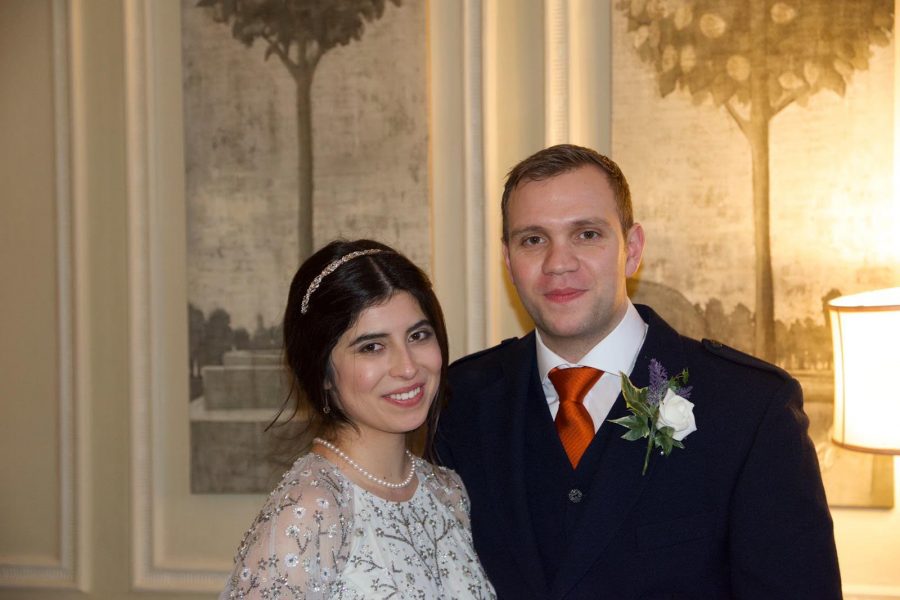Limits on academic freedom in countries such as the United Arab Emirates and China — where NYU has satellite campuses — have resulted in disappearances, imprisonment, censorship and security denials. Academics discussed working in such countries and the role of universities in protecting academic freedom at a panel hosted at the Tisch School of the Arts on Tuesday.
On the panel was formerly imprisoned U.K. postgraduate student Matthew Hedges, Hedges’ wife Daniela Tejada and Henry Reichman, who is the American Association of University Professors Committee Chair on Academic Freedom and Tenure. The College of New Jersey Professor Miriam Lowi moderated the event.
Hedges brought up the case of Xiyue Wang, a graduate student at Princeton University who had been accused of espionage by Iranian officials while on a trip to conduct research for his dissertation. According to The New York Times, Wang had government permission to look through Iran’s National Archives, but he was secretly tried and is currently imprisoned.
“You can pass every step you need to make yourself as a researcher secure, but if the government acts arbitrarily and without rule of law, you can be arrested, you can be detained for anything because you may be a part of something larger than yourself,” Hedges said.
UAE officials arrested Hedges at the Dubai International Airport in May and accused him of espionage. In November, he was sentenced to life imprisonment in the UAE, prompting over 200 NYU faculty members to sign a letter urging NYU President Andrew Hamilton to condemn the UAE’s actions. Hedges was later granted clemency, but his sentencing renewed scrutiny over the existence of academic freedom at NYU Abu Dhabi.
At the event, Hedges recounted his experiences while in solitary confinement in the UAE. Hedges said that when he was first arrested, UAE officials interrogated him for nearly eight hours. In the months following, Hedges said he was threatened with torture, given drugs and medications and experienced suicidal thoughts. Since he was released, Hedges and his wife have been advocating for the preservation of academic freedom.
After the faculty letter was signed, university spokesperson John Beckman said in a statement to WSN that faculty members in the Global Network Committee, as well as administrators, would be discussing Hedges’ case and matters surrounding academic freedom in spring 2019.
Lowi, who is also the chair for MESA Committee on Academic Freedom in the Middle East and North Africa, criticized NYU for its ties to the UAE because of the security and visa denials faculty members have faced in the past when trying to teach or conduct research at NYUAD. Faculty members believe they were denied security clearances and visas on the basis of their research interests and religious affiliations.
“Unfortunately, NYU has not shown itself to be prepared to insist upon the rights and freedom even for its own faculty members to engage in scholarly inquiry of their choosing while in the UAE,” Lowi said. “One could argue that European and Northern American universities should not set up branch campuses in countries where academic freedom and freedom of expression are not valued, since doing so may force those universities to compromise on their values.”
Hamilton said at the time that the university could have handled the visa and security clearance denials better.
“[W]e were deficient in our communications to the individuals involved, and I regret that this exacerbated an already difficult situation.” Hamilton wrote in an email to the Faculty Committee on NYU’s Global Network. “I am consequently committed to immediately improving how we deal with future cases.”
Tejada discussed her campaign to get Hedges released and advocated for increased governmental protections for academics. She cited British Foreign Secretary Jeremy Hunt’s initiatives to protect journalists abroad along with the U.K.’s appointment of Amal Clooney to serve as an envoy to protect media freedom.
“Journalists have multiple protections from governments, newspapers, broadcasters and media,” Tejada said. “However, there has been absolutely no regard for the protection of academics abroad. What is the appointment for academics who are facing the same draconian laws in every other state worldwide?”
Associate Journalism Professor Mohamad Bazzi, who faced a visa denial when trying to teach at NYUAD, attended the event. Bazzi discussed how Hedges’ presentation highlighted the arbitrary nature of the UAE government.
“The red lines in the UAE are constantly changing — the red lines on what is considered to be sensitive by the UAE government and might trigger a response from the government,” Bazzi said. “Students and faculty members need to speak about the future of academic research in the UAE. For people at NYUAD who want to take on sensitive topics, they might face obstacles from the security establishment of the UAE.”
Ultimately, Hedges believed that students need to be trained with proper protocols, so they can be able to protect themselves when conducting research on sensitive topics in authoritarian countries.
“Students, mainly, are left quite vulnerable when undertaking fieldwork abroad,” Hedges said. “They may not know the steps you have to take to insulate yourself through electronic devices, they may not know how to protect their sources when abroad. This is something that we’re trying to engage with at least in the U.K. — how to safely train students to undertake fieldwork abroad.”
Email Meghna Maharishi at [email protected]


























































































































































